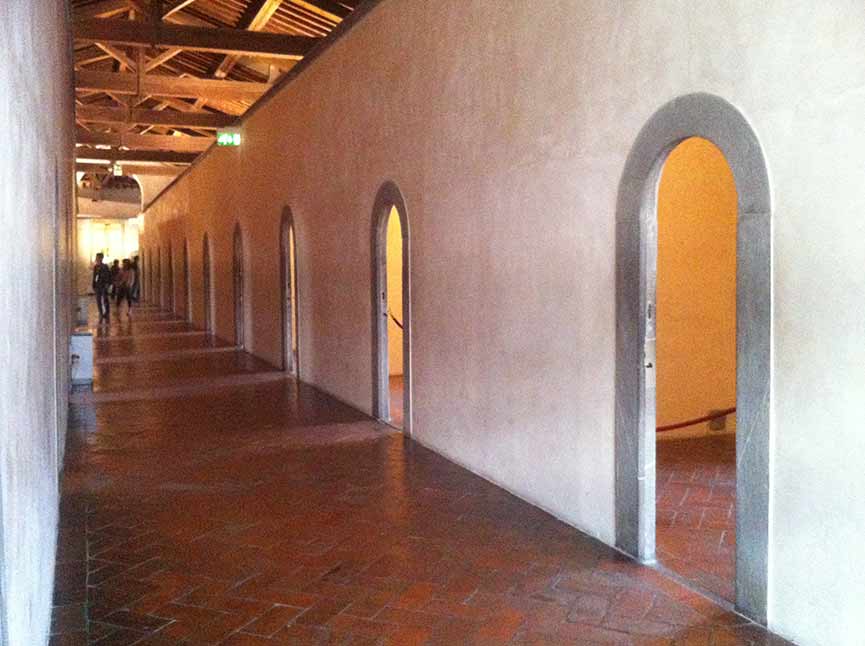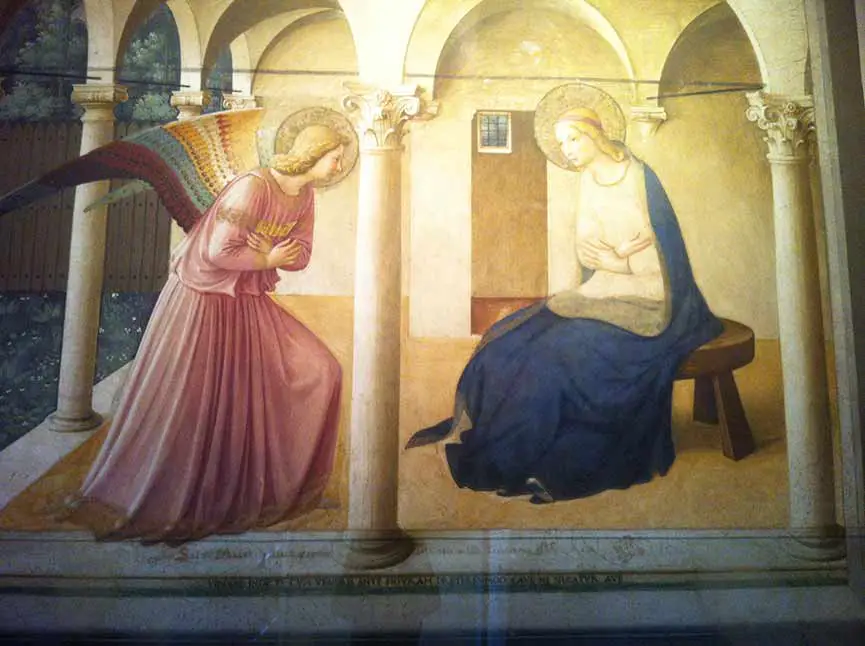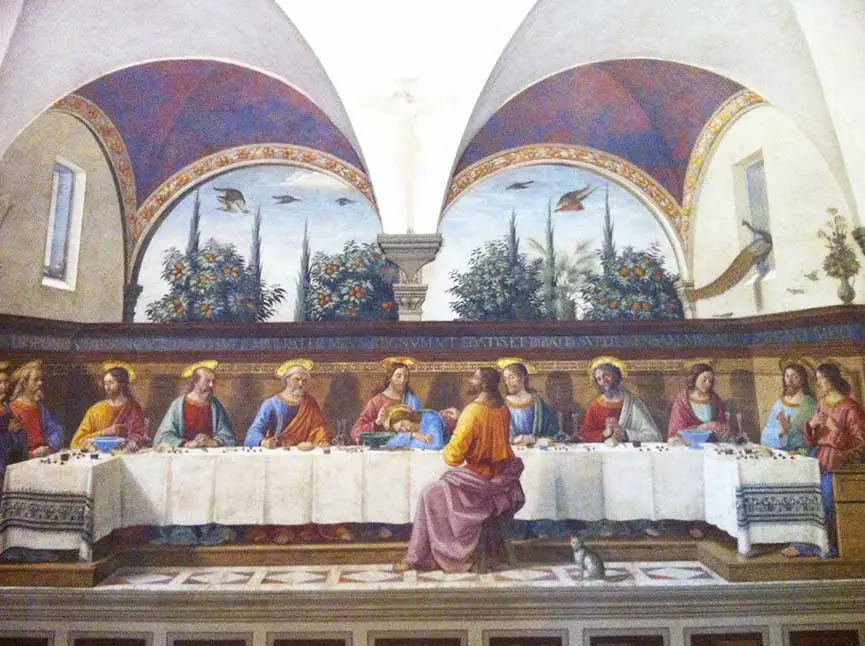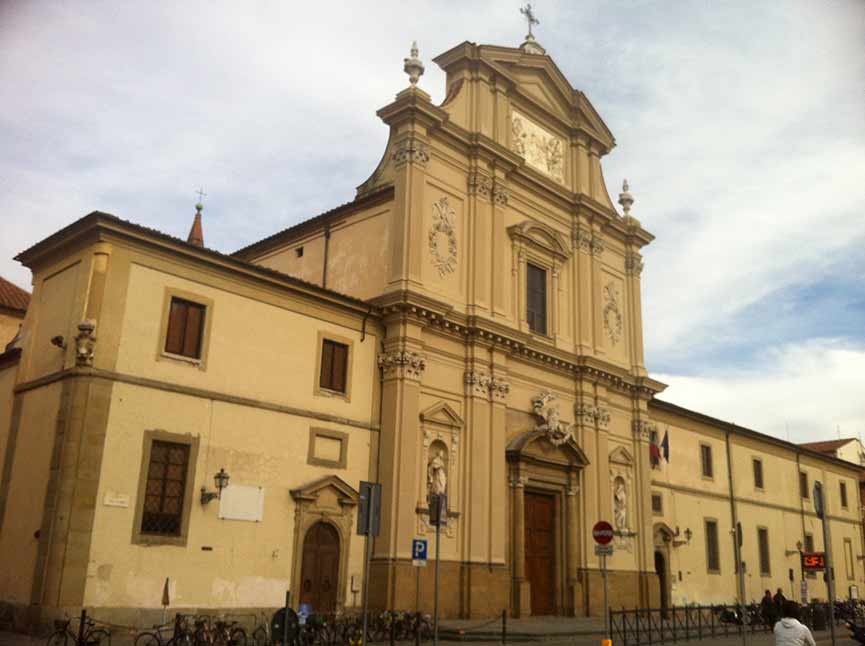|
Services |
|
Dolce
Vita |
How to get to |
|
|
Theaters |
|
|
Restaurants |
|
|
|
|
|
|
|
 Are you coming to Florence? Book your tour in advance and skip the line! Are you coming to Florence? Book your tour in advance and skip the line!

Choose from more than 50 experiences in Florence : museums, private tours and food tours. |
|
Museo di San Marco in Florence: buy skip-the-line tickets online
The Museo di San Marco in Florence: how to get there, the collection on display, history, opening hours, cost nd prices for purchasing tickets and useful information for the visit.
 |
 Museo di San Marco - Piazza San Marco, 3 - Florence Museo di San Marco - Piazza San Marco, 3 - Florence
The San Marco Museum is a state museum in Florence which is part of a Dominican convent located in Piazza San Marco in Florence, adjacent to the church of the same name. The convent itself is a national monument built by Michelozzo - and commissioned by Cosimo de' Medici the Elder after his return to Florence in 1434 - between 1437 and 1443.
The museum holds the largest collection of works by the Renaissance painter Beato Angelico who lived here between 1438 and 1445.
Tickets and Guided Tours including the Museo di San Marco of Florence

Tickets available: Skip-the-line Museo di San Marco ticket. |
|
Works from the collection of Museo di San Marco in Florence
The Museo di San Marco Collection is important because it houses the largest collection in the world of works by the Renaissance painter Beato Angelico

The Museum of San Marco conserves the largest existing collection in the world of works by Beato Angelico but also other Renaissance paintings and frescoes as well as deposits from nineteenth-century demolitions.
Furthermore, here there is also the famous Michelozzo Library, commissioned by Cosimo the Elder, where the texts belonging to the humanist Niccolò Niccoli, a pupil of Poggio Bracciolini, converged. It was the first "public" library of the Renaissance later frequented by authors such as Angelo Poliziano, Marsilio Ficino and Pico della Mirandola.
The museum itinerary begins in the Cloister of Sant'Antonio and continues in the Hospice Room passing through the Refectory Room, the Chapter Room and ends with a visit to the monks' cells.
The Cloister dates back to the restructuring by Michelozzo in 1440 and is a Renaissance portico arranged on four sides covered by cross vaults and slender columns; here in correspondence with the five ogival lunettes on the doors that give onto the cloister there are frescoes by Beato Angelico.
Passing through the Sala dell'Ospizio, which welcomed the humblest pilgrims, one can admire the collection of the most important paintings on wood by Angelico including the Deposition (1432-4), the Triptych of San Pietro Martire (1429), the Lamentation on the Dead Christ (1436) and the San Marco Altarpiece (1440). The room also houses the Tabernacle of the Linaioli, a work from 1434 created in collaboration with Lorenzo Ghiberti.
From this room one passes to the Chapter Room which houses another masterpiece by Angelico, the Crucifixion (1442). Other rooms along the route are the Sala del Lavabo, where the monks washed their hands before meals, which houses a Last Judgment by Fra' Bartolomeo completed in 1501 by Mariotto Albertinelli. The adjacent Sala del Refettorio is a triumph of works by Giovanni Antonio Sogliani which culminates with the Providence of the Dominicans (1536) above which is the Crucifixion.
Passing through smaller rooms, one then reaches the Minor Refectory of the guesthouse which houses a Last Supper signed in 1486 by Domenico Ghirlandaio and assistants.
The first floor houses the lodgings or rather cells of the monks that Michelozzo designed by leaving large surfaces exposed to then be frescoed as Angelico did in 5 years. Immediately after the stairs one arrives in front of the master's masterpiece the Annunciation (1442), an innovative work for the diagonal arrangement of the two protagonists.
At the end of the works, the plan turned out to be the largest fresco project ever made in a convent for the time with its 44 wall frescoes.

Masterpieces from the Collection of the Museum of San Marco
– Beato Angelico: Triptych of San Pietro Martire (1429), Altarpiece Di Annalena (1430), Last Judgment (1431), Deposition (1432-4), Lamentation over the Dead Christ (1436), Altarpiece of San Marco (1440), Madonna with the Child, Tabernacle of the Linaioli (1434), Crucifixion with San Domenico (1442), Annunciation (1442), Altarpiece of Bosco ai Frati (1450).
– Ghirlandaio: Last Supper.
– Paolo Uccello: Madonna and Child.
– Fra’ Bartolomeo: Portrait of Girolamo Savonarola (1498)
– Giovanni Antonio Sogliani: paintings.
– Della Robbia: terracotta. |
|
History of the Museum of San Marco in Florence
The history of the San Marco Museum begins with a royal decree on 22 June 1866. |

The history of the San Marco Museum begins with a royal decree in 1866 which confiscated the complex, leaving the church and the rooms overlooking the cloister to the curia.
Furthermore, before this period the frescoes by Beato Angelico were restored by the painter Gaetano Bianchi and in 1906 the architectural remains of the nineteenth-century demolitions arrived here.
It was decided to create the Museum of Ancient Florence whose works are partly visible at the end of the itinerary of today's museum. It was then decided, in the 1920s - to transfer here also the works on wood by Beato Angelico from the Uffizi and the Academy, thus creating the largest existing collection of the artist.
In 2017 the prior provincial of the Dominicans decided to suppress the convent of San Marco.
Accessibility of the San Marco Museum
The sidewalk is not connected to the road and there is a step to go down in the entrance door, which can be overcome via a mobile platform (requested from the staff on duty). The interior of the Museum features a cabin lift platform that reaches the first floor and a series of platforms at the entrance to the various exhibition halls.
The toilet for disabled visitors is located on the ground floor. The exit cannot be used with wheelchairs; you exit from the Museum entrance. |
|
How to reach the Museo di San Marco in Florence
The San Marco Museum is located in the center of Florence, 500 meters from Piazza del Duomo.
Arriving by train
From Santa Maria Novella station you can get there on foot in about 15 minutes (1 km).
Arriving by bus
The closest bus stop is in Piazza San Marco in front of the museum. From Santa Maria Novella station you can get there on line 9 every 9 minutes. Other bus lines that stop at the museum: 6, 14, 23, 31, 32
Arriving by car
The closest car parks are Garage San Gallo, Garage Michelangelo, Garage Orsola, Parking San Zanobi (for a fee). They are located just 300 meters on foot from the Museum. |
|
|